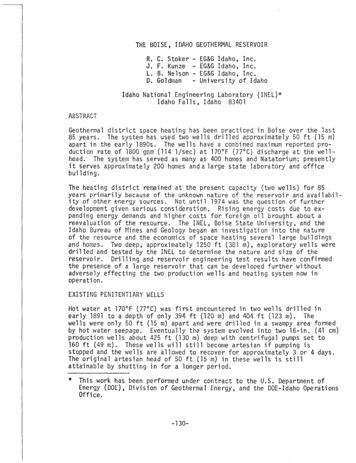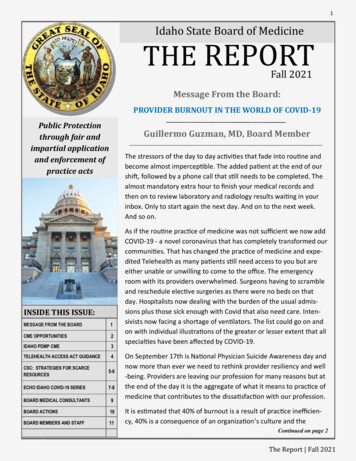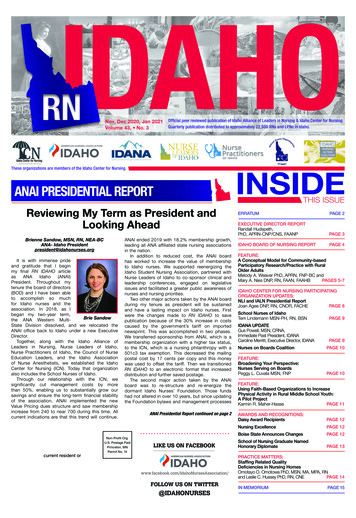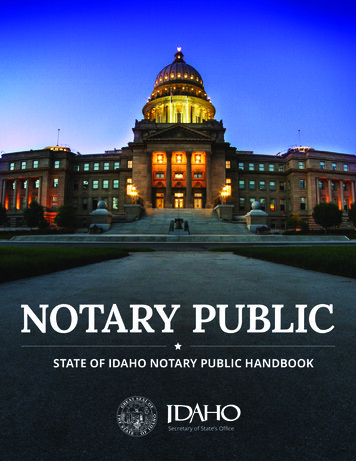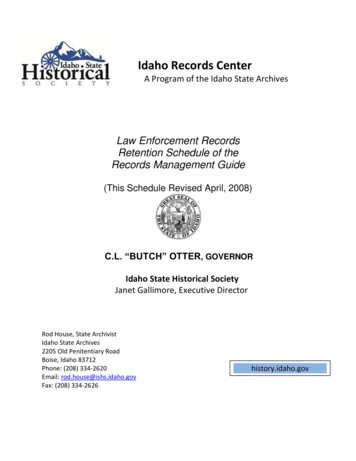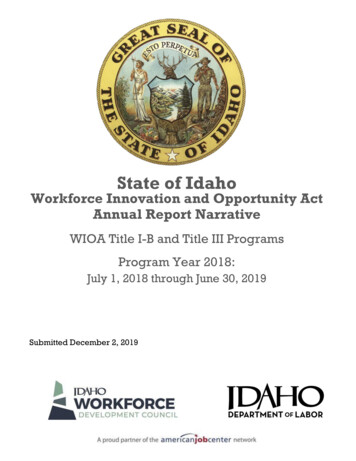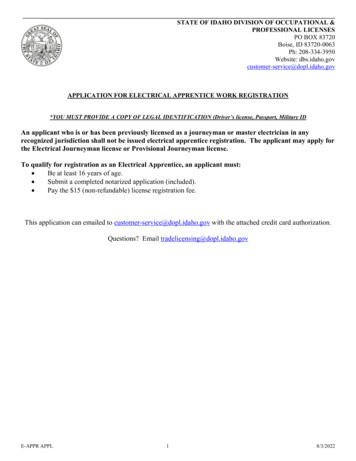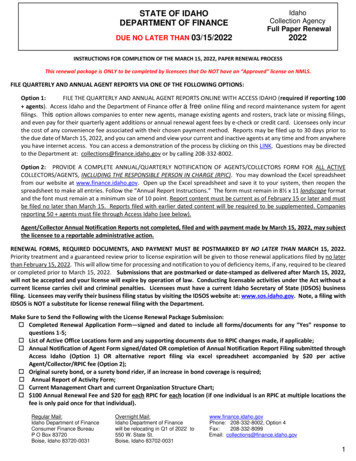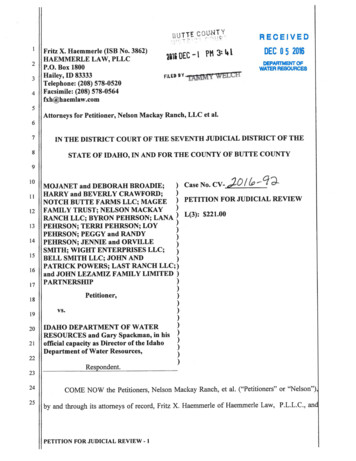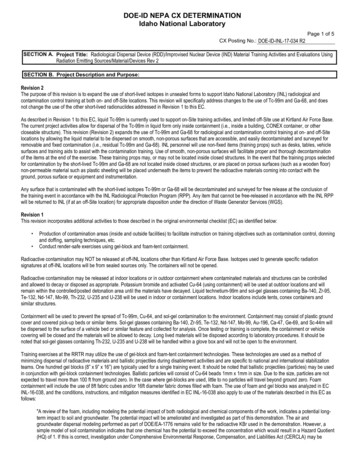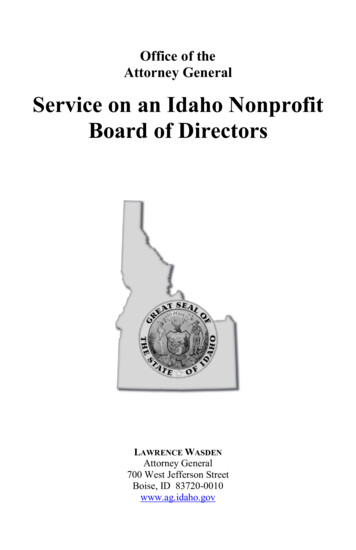
Transcription
Office of theAttorney GeneralService on an Idaho NonprofitBoard of DirectorsLAWRENCE WASDENAttorney General700 West Jefferson StreetBoise, ID 83720-0010www.ag.idaho.gov
State of IdahoOffice of Attorney GeneralLawrence WasdenIdaho is a great place to live and charitable organizations make asignificant contribution to Idaho’s quality of life. Idahoans benefitgreatly from the services and goods these organizations provide.Many charities are led by volunteers who give their time and talentto help organizations accomplish their charitable missions.Charitable corporations and organizations vary in size, mission, andstructure, but there are several principles and rules applicable to thepeople who serve on their boards of directors. This manual isprovided to assist board members in fulfilling their duties. In short,board members need to understand the three “R’s” of serving as adirector: the Role they fulfill, the Rights they have, and theResponsibilities placed upon them.This manual is not a substitute for the advice of a qualified attorney.The Attorney General encourages boards to consult withprofessional advisors, including attorneys and accountants, to helptheir organizations comply with the law. Attorneys within theAttorney General’s Office cannot give legal advice to privatepersons or entities. Additionally, the Attorney General does notenforce the Idaho Nonprofit Corporation Act, the primary law thatgoverns the internal organization and operations of nonprofits.On behalf of all Idahoans, I thank the board members of Idaho’scharities for their service. It is needed and respected. I hope thismanual helps board members fulfill their duties.I would also like to thank the Idaho Nonprofit Center for assistingmy office in the preparation of this manual.Sincerely,LAWRENCE G. WASDENAttorney General
Table of ContentsSERVICE ON A CHARITABLE ORGANIZATION . 1UNDERSTANDING A BOARD MEMBER’S ROLE . 1UNDERSTANDING A BOARD MEMBER’S RIGHTS . 3UNDERSTANDING A BOARD MEMBER’SRESPONSIBILITIES . 3DUTY OF CARE .4DUTY OF LOYALTY .4DUTY OF OBEDIENCE .6PERSONAL LIABILITY . 8RESOURCES . 9
SERVICE ON A CHARITABLE ORGANIZATIONThis manual is intended to assist persons serving on a boardof directors of an Idaho charitable corporation. The IdahoNonprofit Corporation Act states that unless a nonprofitcorporation’s articles of incorporation place management ofthe corporation in its members or in a third person, the affairsof the nonprofit shall be managed by a board of directors.While it is true that not every charitable organization is anonprofit corporation, it is common for organizations to begoverned by a board of directors.UNDERSTANDING A BOARD MEMBER’S ROLEPeople serve on a charitable organization’s board of directorsfor various reasons. Some may be skilled fundraisers. Othersmay have social standing. Still others may have specialknowledge and expertise. Regardless of the reason forserving, each board member needs to understand thatfundamentally his or her role is akin to one of a fiduciary.In the law, a fiduciary is someone who holds a position of trustand from whom scrupulous good faith and candor is expected.This is certainly true for a board member, who is charged toact for the benefit of a charity and to manage the charitableassets for the use and benefit of the community.This fiduciary role of the charity cannot be over-emphasized.Each board member is ultimately responsible for thecharitable organization’s mission, its charitable trust assets,and its place in the community.Successful fulfillment of this role requires a clearunderstanding of the charitable organization and its purposes,assets, and mission. Board members must participate activelyin the charity’s governing and supporting activities. Those1
who do not have the time to participate regularly should notserve on a board.Perhaps the most important responsibility of a board memberis ensuring that the organization is operated for its statedcharitable purposes. It cannot be operated for any otherpurposes.A board member must ensure that theorganization’s assets are held “in trust” to be applied to itscharitable mission. Allowing the charitable organization to bediverted from its mission or allowing its charitable trust assetsto be used for purposes outside its stated mission violates thattrust and is impermissible.Keeping a charitable organization’s resources and effortsfocused on its mission requires the board member tounderstand the organization’s programs, people, and availableresources. As a starting point, every board member should befamiliar with the charitable organization’s articles ofincorporation and bylaws.The articles of incorporation include the general charitablepurposes for which the organization was created. The bylawsare the rules by which the board agrees to govern itself.If the charitable organization has received tax exempt statusfrom the IRS, the board member should also be familiar withthe information that the charitable organization submitted onits application to the IRS that qualified the charity for taxexemption. For a charitable organization that has beengranted “501(c)(3)” status by the IRS, the application is on anIRS form called Form 1023. This form must be madeavailable to the public. A charitable organization’s tax exemptstatus is something of great value, and board members shouldbe aware of what went into obtaining the exemption and whatis necessary to maintain the status.2
UNDERSTANDING A BOARD MEMBER’S RIGHTSThe board member must make informed decisions aboutimportant matters involving the organization’s assets andoperations in order to carry out his or her legal responsibilitiesand to serve properly as a fiduciary of the charitableorganization. In making these decisions, a board membershould understand that the law permits him or her toreasonably rely on information he or she receives from thecharitable organization’s staff, its lawyer, its accountant, itsoutside advisors, and its board committees.A board member also has various rights to obtain informationthat relates to the charitable organization and its activities. Forexample, the board member has the right of reasonable accessto: the organization’s management (most likely theexecutive director or chief executive officer); internal information of the organization; the organization’s principal advisors, such as itsauditors and lawyers; and financial statements and records of the charity,including minutes of board meetings.The board has the right, if necessary, to engage the services ofoutside advisors, at the charity’s expense, to assist it with aparticular matter. In short, board members have the right ofaccess to and the obtaining of relevant information about thecharity.UNDERSTANDING A BOARD MEMBER’SRESPONSIBILITIESA member of a charitable organization’s board of directors hasthree basic responsibilities or duties. Each is a duty of trust.3
The duties are that of care, loyalty, and obedience.Duty of CareThe duty of care is the level of competence expected of aboard member as he or she fulfills his or her responsibilities.In a nutshell, the most commonly used duty of care standardstates that a board member must use the same care that anordinarily prudent person would exercise in a like position andunder similar circumstances. Acting with due care does notmean that the board member cannot take risks, cannot makemistakes, and can never be wrong. Rather, it means that theboard member must act with common sense and with aninformed judgment.In order to act with due care, a board member needs to activelyparticipate in the governance of the organization. This meansattending board meetings regularly, reviewing relevantreports, and reading minutes of various meetings.Acting with due care also means the board member makesrelevant, reasonable inquiries concerning the organization. Aboard member needs to obtain sufficient information so thathe or she can carry out the responsibilities of the boardmember. When a problem exists or a report on its face doesnot make sense, a board member has a duty to inquire into thefacts and circumstances.A board member also has a duty to investigate and respond towarnings or reports of officer or employee theft,mismanagement, or malfeasance. The bottom line is that aboard member acting with due care is informed about theorganization’s activities.Duty of LoyaltyThe duty of loyalty is the commitment a board member makes4
to the organization. A board member is expected to give hisor her undivided allegiance to the charitable organization. Theboard member cannot use for personal gain any informationobtained from his or her position on the board and should notdiscuss confidential board business with outsiders.Decisions regarding the organization’s funds and activitiesmust promote the organization’s stated public purposes, ratherthan the board member’s personal interests. However,although the board member must put the organization’sinterests ahead of the interests of family, friends, or business,a board member is permitted to have business dealings withthe organization.Part of the duty of loyalty deals with conflict of interestsituations that can arise. Conflicts of interest can occur whenthe organization is considering a transaction with a boardmember, members of the organization or staff of theorganization that may also benefit that person’s personal,family or professional interests. Such actions should becarefully scrutinized because the public may be suspicious ofsuch activities.The board should establish a written policy for addressingconflicts of interest. The policy should include provisions foran interested board member’s disclosure of financial interests,withdrawal from discussions where a conflict of interest isidentified, and abstention from voting. Because of thesensitivity of conflicts of interest, it is recommended that atransaction that benefits one board member should proceedonly if a super-majority of the board consents. The IRSprovides a comprehensive sample conflicts of interest policythat can be found in appendix A of the instructions for IRSForm 1023.5
Duty of ObedienceThe duty of obedience refers to a board member’s obligationto keep the charity focused on its mission, in compliance withthe organization’s organizing documents (normally theorganization’s articles of incorporation and bylaws) and taxexempt status, and lawfully using its funds. Board membersmust comply with state and federal laws applicable to theorganization.For example, board members should understand: Federal Law. Most charitable organizations mustapply to the Internal Revenue Service for approval asa tax-exempt organization. Corporations that fail toobtain tax-exempt status are taxed at applicablecorporate income tax rates, and contributors cannottake an income tax deduction for their donations. Mostnonprofit corporations are required to file financialand other information with the IRS, using theappropriate version of IRS Form 990. Idaho Law. An Idaho nonprofit corporation mustannually renew its status with the State by filing a formwith the Idaho Secretary of State. The form requires alisting of the board of directors, but does not ask forfinancial information. Laws of Other States. If a charity is doing businessoutside of Idaho, a board member will want to ensurethat the charity is in compliance with other states’charitable registration requirements. Bylaws and Policies. Board members should befamiliar with bylaws and policies adopted by the boardof directors to ensure that the organization followstheir provisions. Board members are responsible for6
updating these documents as the corporation’sconditions or mission changes.The board must give proper notice to members formeetings, hold regular meetings, appoint boardmembers, and carry out the organization’s mission.Minutes of board meetings and records of all actionstaken by the corporation should be kept andmaintained.Boards may adopt a variety of policies useful forgoverning. These policies may address conflicts ofinterest, financial documentation, expenditures,personnel hiring and retention, fundraising, andexecutive and staff compensation. Proper Financial Controls. Board members mustensure that the organization’s financial records arekept current and accurate. Effective financial controlsare crucial to safeguarding an organization’s assetsfrom theft and financial impropriety. Connected tothis responsibility, the board should review andapprove the corporation’s annual budget.Theorganization’s treasurer should provide the board withcurrent and thorough income and expense statements,balance sheets and budget status reports, preferably inadvance of the board meeting. Donations and Responsible Solicitation Activities.All donations must be used to further theorganization’s stated mission. However, donors maydesignate that their gifts be used for a particularpurpose. If the charity accepts such a gift, it mustcomply with the donor’s instructions and use thedonation for the designated purpose.Some charities contract with professional fundraisersto solicit donations on the charity’s behalf. To avoidlegal complications and financial disaster, it is7
important to hire a reputable, trustworthy fundraiserpursuant to a written contract that clearly sets forth theagreed-upon duties. The charity should review thefundraiser’s references and investigate the fundraiser’spast activities.Receiving angry complaints orundergoing a law enforcement investigation becauseof a third-party telemarketer’s unlawful or annoyingactivities can destroy a charity’s reputation.Any contract with a professional fundraiser should befair and reasonable, especially the terms ofcompensation. Most donors reasonably expect thatmost of their contributions will go to the charity andnot to the fundraiser. It is generally consideredunethical for a fundraiser to be paid a percentage offunds raised, though it is not illegal in Idaho to do so.PERSONAL LIABILITYBoard members of a charitable corporation can becomedefendants in a lawsuit filed by someone who believes theorganization caused the person an injury or financial loss.However, to encourage citizens to serve on boards, lawmakersenacted a “qualified immunity” law. This means volunteermembers cannot be sued for their negligent acts. A member,however, is subject to suit based on the member’s “gross”negligence or his or her willful or fraudulent acts.Because some degree of litigation risk exists for boardmembers, including the cost of defending a frivolous lawsuit,a charity should consider purchasing directors and officers(D&O) liability insurance.Including indemnificationprovisions in the organization’s governing documents or in itsagreements with the board members also helps minimize theboard member’s liability.8
RESOURCESIdaho Nonprofit Corporation Act, Title 30, Chapter 30,Idaho CodeAvailable online at www.legislature.idaho.govIdaho Nonprofit Center5257 W. Fairview Avenue, Suite 260Boise, ID 83706(208) 424-2229www.idahononprofits.orgInternal Revenue Servicewww.irs.gov/charitiesBoardSource1828 L Street NW, Suite 900Washington, D.C. 20036-5104(202) 452-6262www.boardsource.org9
Funds collected by the Attorney General’s Consumer ProtectionDivision as the result of enforcement actions paid for this pamphlet.No tax monies were used.LAWRENCE G. WASDENOffice of the Attorney General State of IdahoConsumer Protection DivisionP.O. Box 83720 Boise, ID 83720-0010954 W. Jefferson St., 2nd Fl. Boise, ID 83702(208) 334-2424 (local) (800) 432-3545 (in Idaho)www.ag.idaho.govRev. 03/21
Idaho Law. An Idaho nonprofit corporation must annually renew its status with the State by filing a form with the Idaho Secretary of State. T he form requires a listing of the board of directors, but does not ask for financial information. Laws of Other States. If a charity is doing business outside of Idaho, a board member will want to ensure
